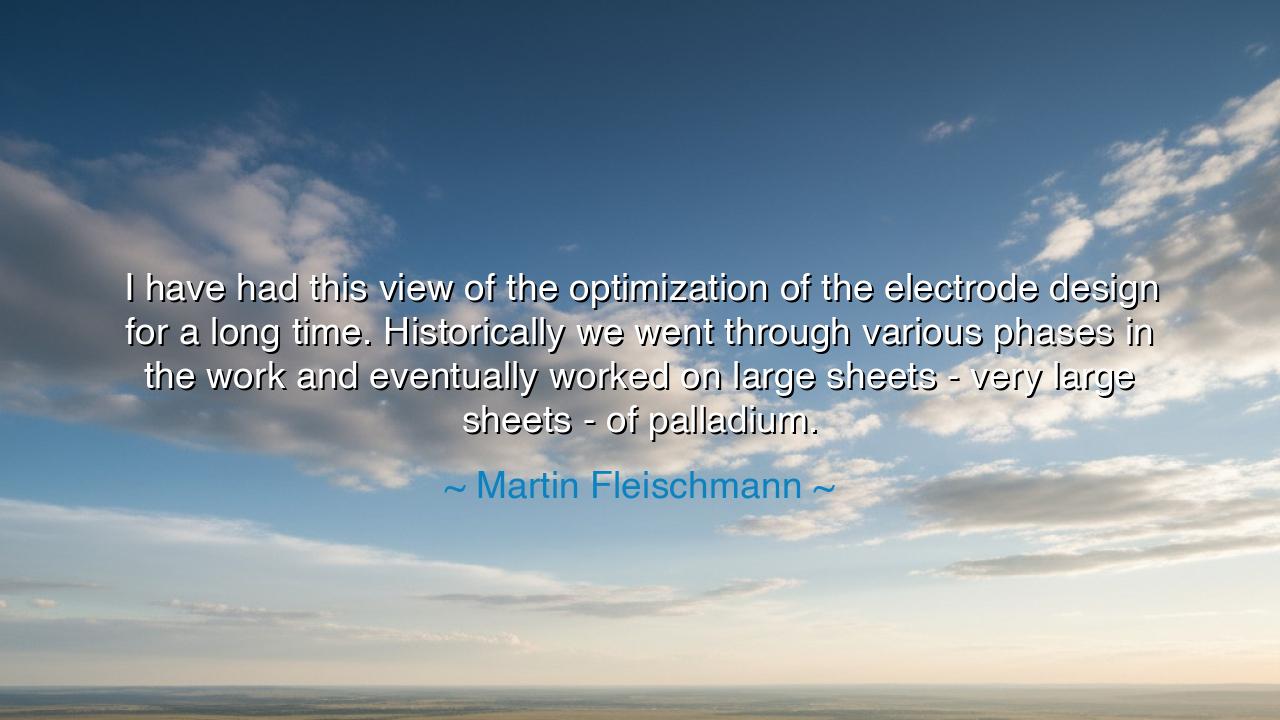
I have had this view of the optimization of the electrode design
I have had this view of the optimization of the electrode design for a long time. Historically we went through various phases in the work and eventually worked on large sheets - very large sheets - of palladium.






“I have had this view of the optimization of the electrode design for a long time. Historically we went through various phases in the work and eventually worked on large sheets — very large sheets — of palladium.” Thus spoke Martin Fleischmann, a man whose mind dared to explore the mysteries that lie between science and the unknown. His words, at first, seem purely technical, but within them beats the ancient rhythm of perseverance, vision, and the unending quest for mastery. For in this quiet reflection lies a universal truth: that progress, whether in science or in life, is born not from sudden brilliance but from patient refinement—the long, deliberate optimization of one’s craft.
In the laboratories of the modern age, Fleischmann was not unlike the alchemists of old—those seekers who believed that through careful study of matter, one could uncover divine principles of creation itself. His work with electrodes and palladium was not simply about metals and reactions; it was about unlocking potential hidden within the smallest structures of the universe. He speaks of phases—those periods of trial, failure, and adjustment that every true creator must endure. For the ancients knew, as Fleischmann did, that mastery does not arrive in a single stroke of discovery; it is forged through countless refinements, through errors that become teachers and obstacles that shape wisdom.
Palladium, the metal he speaks of, is no ordinary substance. It is rare, pure, and noble—a fitting symbol for the human spirit when disciplined by purpose. Fleischmann’s “large sheets of palladium” are not only instruments of scientific experimentation; they are emblems of the expansion of understanding, the reaching outward from small beginnings to grand visions. Just as the blacksmith tempers his steel by fire and water, so too did Fleischmann temper his ideas through the fire of experimentation and the patience of repetition. His “large sheets” signify both literal progress and the metaphoric enlargement of human curiosity—a testament to the persistence of those who will not abandon a vision, even when the world doubts them.
History is filled with such figures. Consider Thomas Edison, who, in his quest to perfect the electric light, tested thousands of filaments before finding one that burned with endurance. Each trial, each failure, was another phase in his “optimization of design.” Like Fleischmann, Edison knew that discovery is not a single moment of revelation but a long pilgrimage of refinement. Their kind shares a sacred patience—the willingness to work in obscurity, guided by faith in unseen potential. It is a kind of hope refined by discipline, the steady light of those who know that truth is found only by those who keep searching.
Yet Fleischmann’s words also carry a subtler wisdom: that knowledge itself evolves in phases. What we believe to be complete today becomes merely the foundation of tomorrow’s questions. This is why he speaks not with arrogance but with reflection—“we went through various phases in the work.” Such humility is rare among those who touch the boundaries of science. It is the humility of the true seeker who understands that perfection is not an end but a horizon that moves as one approaches it. Optimization is not the pursuit of flawlessness—it is the lifelong journey toward improvement.
And so, his statement becomes a teaching for all who labor in any craft. Whatever your field—be it art, science, or living itself—remember that greatness is not born from haste. It is forged in the quiet repetition of care, the adjustment of small details, the steady refining of design. The master is not the one who finishes first, but the one who continues longest, shaping and reshaping until form aligns with vision. Fleischmann’s devotion to his electrodes is the same spirit that drives every builder, thinker, and dreamer who seeks to touch the eternal through the material.
Let this be the lesson passed down: be patient in your creation. Do not fear the phases of uncertainty, for they are the necessary steps of all progress. Work with precision, and when the world demands haste, choose refinement. Whether your material is metal, word, or soul, keep improving it—layer by layer, phase by phase—until it reflects your highest truth.
For, as Fleischmann’s quiet wisdom reminds us, every great endeavor—every instrument, every art, every life—must be designed, refined, and expanded, until the small spark of vision becomes a vast, shining sheet of understanding, capable of carrying the current of human greatness itself.






AAdministratorAdministrator
Welcome, honored guests. Please leave a comment, we will respond soon